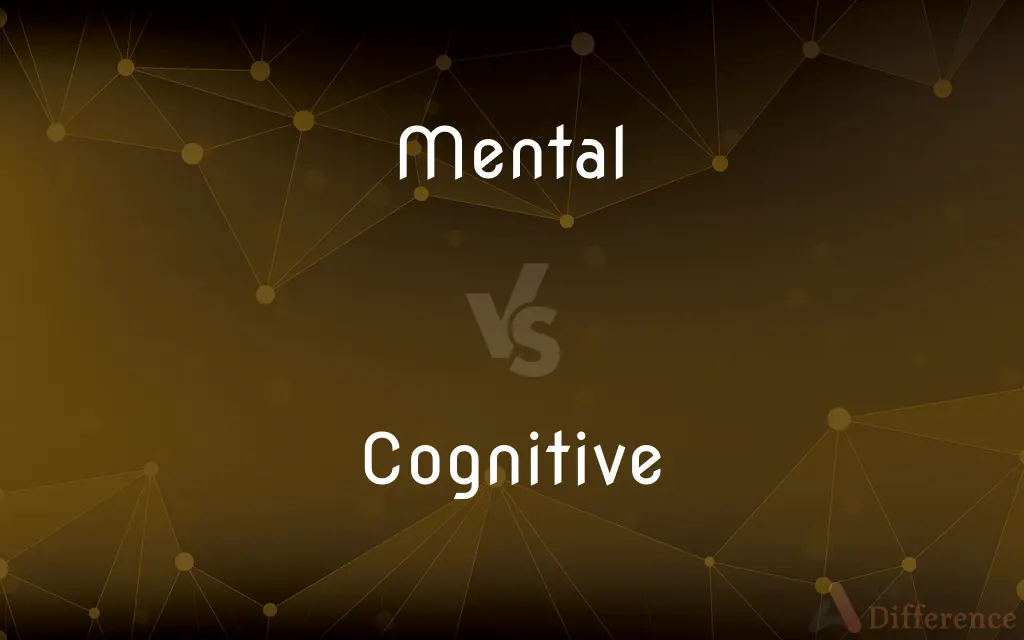Mental vs. Cognitive — What's the Difference?
By Tayyaba Rehman & Urooj Arif — Updated on April 29, 2024
Mental relates broadly to the mind and encompasses emotional and psychological aspects, whereas cognitive specifically refers to the processes involved in thinking, like perception and memory.

Difference Between Mental and Cognitive
Table of Contents
ADVERTISEMENT
Key Differences
Mental health encompasses the overall well-being of a person, including emotional stability and psychological balance, while cognitive functions are specifically concerned with processes such as learning, reasoning, and memory. Mental health is a broad term that includes cognitive health but also spans additional dimensions such as emotional and behavioral health.
Cognitive abilities are the specific mental capacities involved in processing information, solving problems, and making decisions. Mental health, on the other hand, affects how well people can use their cognitive abilities in daily life. Poor mental health can impair cognitive functions, affecting concentration, memory, and decision-making processes.
Mental disorders include a wide range of issues, from mood disorders like depression to more complex conditions like schizophrenia. Cognitive disorders, however, primarily focus on impairments in mental processes such as memory loss, language difficulties, and problems with attention.
Therapies for mental health issues may include counseling, medication, and holistic approaches like exercise or meditation. Cognitive therapies, however, often focus specifically on improving cognitive function through activities designed to enhance memory, problem-solving skills, and other mental capabilities.
While mental health can influence one's overall perception of life and interactions with others, cognitive abilities are more about how a person understands, processes, and responds to information. Both are crucial for overall well-being, but they play distinctly different roles in daily life.
ADVERTISEMENT
Comparison Chart
Focus
Overall emotional and psychological well-being
Specific mental processes like thinking
Disorders
Mood disorders, anxiety disorders, schizophrenia
Dementia, Alzheimer’s, learning disabilities
Therapies
Counseling, medication, lifestyle changes
Cognitive rehabilitation, memory training
Impact on Daily Life
Affects mood, behavior, and social interactions
Affects learning, reasoning, and memory
Treatment Goals
Achieve emotional stability, manage behaviors
Enhance and restore cognitive functions
Compare with Definitions
Mental
Relating to the mind or psychological processes.
Mental exercises like puzzles can help improve your mood.
Cognitive
Related to the intellectual process as opposed to emotional.
Her cognitive response was well thought out, despite the emotional context.
Mental
Affecting the mind or its capacities.
Stress can have a severe mental impact, leading to anxiety.
Cognitive
Involving memory, reasoning, and awareness.
Cognitive decline can be mitigated with mental exercises.
Mental
Pertaining to disorders of the mind.
Mental health awareness is crucial for early diagnosis and treatment.
Cognitive
Pertaining to the mental action of learning and understanding.
Cognitive development is crucial in early childhood.
Mental
Concerned with intellectual capabilities.
Reading regularly enhances your mental agility.
Cognitive
Concerned with theoretical or logical aspects of thought.
Cognitive sciences study how people think and learn.
Mental
Involving the process of thinking or reasoning, not physical.
Chess is a mental sport that requires strategic thinking.
Cognitive
Relating to cognition, involving the mental process of knowing.
Cognitive skills are essential for problem-solving.
Mental
Relating to the mind
Mental faculties
Mental phenomena
Cognitive
Of, characterized by, involving, or relating to cognition
"For the person experiencing cognitive decline, the slow loss of coherent speech will be compounded by a declining ability to draw conclusions" (Joanne Koenig Coste).
Mental
Relating to disorders of the mind
A mental hospital
Cognitive
Relating to the part of mental functions that deals with logic, as opposed to affective which deals with emotions.
Mental
Of or relating to the mind
Mental powers.
Mental health.
Cognitive
Intellectual.
Mental
Executed or performed by the mind; existing in the mind
Mental calculation.
A mental image.
Cognitive
Cognate; which is to be recognized as cognate.
Mental
(Slang) Emotionally upset; crazed
Got mental when he saw the dent in his new car.
Cognitive
Cognate.
Mental
Offensive Slang Having a mental illness or intellectual disability.
Cognitive
Knowing, or apprehending by the understanding; as, cognitive power.
Mental
Often Offensive Relating to or being a place for housing or treating people with mental illness or intellectual disability
A mental ward.
Cognitive
Of or being or relating to or involving cognition;
Cognitive psychology
Cognitive style
Mental
Of or relating to the chin.
Mental
(relational) Of or relating to the mind or specifically the total emotional and intellectual response of an individual to external reality.
Mental
Of or relating to intellectual as contrasted with emotional activity.
Mental acuity
Mental
Of, relating to, or being intellectual as contrasted with overt physical activity.
Mental
Occurring or experienced in the mind.
Mental
Relating to the mind, its activity, or its products as an object of study.
Mental science
Mental
Relating to spirit or idea as opposed to matter.
The distinction between physical things and mental ideas
Mental
Of, relating to, or affected by a psychiatric disorder.
A mental patient
Mental
(relational) Intended for the care or treatment of persons affected by psychiatric disorders.
Mental hospitals
Mental
Mentally disordered; insane, mad, crazy.
He is the most mental freshman I've seen yet.
He went mental on us.
Mental
Enjoyable or fun, especially in a frenetic way.
That was a mental party last night.
Mental
Of or relating to telepathic or mind-reading powers.
Mental telepathy
Mental
Of or relating to the chin or median part of the lower jaw, genial.
The mental nerve, the mental region
Mental
Of or relating to the chinlike or liplike structure.
Mental
(zootomy) A plate or scale covering the mentum or chin of a fish or reptile.
Mental
Of or pertaining to the chin; genian; as, the mental nerve; the mental region.
Mental
Of or pertaining to the mind; intellectual; as, mental faculties; mental operations, conditions, or exercise.
What a mental powerThis eye shoots forth!
Mental
A plate or scale covering the mentum or chin of a fish or reptile.
Mental
Involving the mind or an intellectual process;
Mental images of happy times
Mental calculations
In a terrible mental state
Mental suffering
Free from mental defects
Mental
Of or relating to the mind;
Mental powers
Mental development
Mental hygiene
Mental
Of or relating to the chin- or lip-like structure in insects and certain mollusks
Mental
Of or relating to the chin or median part of the lower jaw
Mental
Affected by a disorder of the mind;
A mental patient
Mental illness
Common Curiosities
What is the main difference between mental and cognitive?
Mental refers to the overall condition of the mind, including emotional and psychological aspects, while cognitive specifically pertains to the processes involved in thinking and understanding.
Can cognitive functions affect mental health?
Yes, impaired cognitive functions can negatively impact mental health by affecting one’s ability to process and react to emotions and situations effectively.
Are mental disorders the same as cognitive disorders?
No, mental disorders encompass a broader range of issues including emotional and behavioral disorders, whereas cognitive disorders specifically relate to impairments in mental processing abilities.
How can one improve their cognitive abilities?
Cognitive abilities can be improved through various mental exercises, educational activities, and certain brain training programs.
Does poor mental health always lead to cognitive impairments?
Not always, but poor mental health can affect cognitive functions like concentration, memory, and decision-making.
How do therapies differ for mental and cognitive issues?
Therapies for mental issues often include a holistic approach with psychological counseling and lifestyle changes, whereas cognitive therapies focus more on specific techniques to enhance mental functions.
What role does education play in cognitive and mental health?
Education enhances cognitive abilities and can also improve mental health by providing better coping mechanisms and understanding of one’s emotions and behaviors.
Is there a genetic predisposition to cognitive or mental issues?
Both cognitive and mental issues can have genetic predispositions, but environmental factors also play a significant role in their development.
What impact do lifestyle choices have on mental and cognitive health?
Lifestyle choices like diet, exercise, and social interactions significantly impact both mental and cognitive health.
What are common treatments for cognitive impairments?
Treatments for cognitive impairments may include cognitive rehabilitation, memory training exercises, and sometimes medication.
Can someone have good cognitive functions but poor mental health?
Yes, it is possible to have strong cognitive abilities while experiencing poor mental health due to emotional or psychological issues.
Are there preventive measures for cognitive decline?
Preventive measures include maintaining a healthy lifestyle, engaging in regular mental and physical exercises, and having a balanced diet rich in nutrients that support brain health.
How does aging affect mental and cognitive health?
Aging can impact both mental and cognitive health, typically seeing a decline in cognitive functions and an increase in various mental health challenges.
Can mental and cognitive health be measured?
Yes, both can be measured using various psychological tests and cognitive assessments to evaluate mental state and brain function.
How do mental and cognitive health interact in daily life?
They interact continuously as cognitive processes are used to handle daily tasks and decisions, while mental health influences mood, motivation, and overall psychological resilience.
Share Your Discovery

Previous Comparison
Alphanumeric vs. Numeric
Next Comparison
Bequeath vs. BequestAuthor Spotlight
Written by
Tayyaba RehmanTayyaba Rehman is a distinguished writer, currently serving as a primary contributor to askdifference.com. As a researcher in semantics and etymology, Tayyaba's passion for the complexity of languages and their distinctions has found a perfect home on the platform. Tayyaba delves into the intricacies of language, distinguishing between commonly confused words and phrases, thereby providing clarity for readers worldwide.
Co-written by
Urooj ArifUrooj is a skilled content writer at Ask Difference, known for her exceptional ability to simplify complex topics into engaging and informative content. With a passion for research and a flair for clear, concise writing, she consistently delivers articles that resonate with our diverse audience.
















































